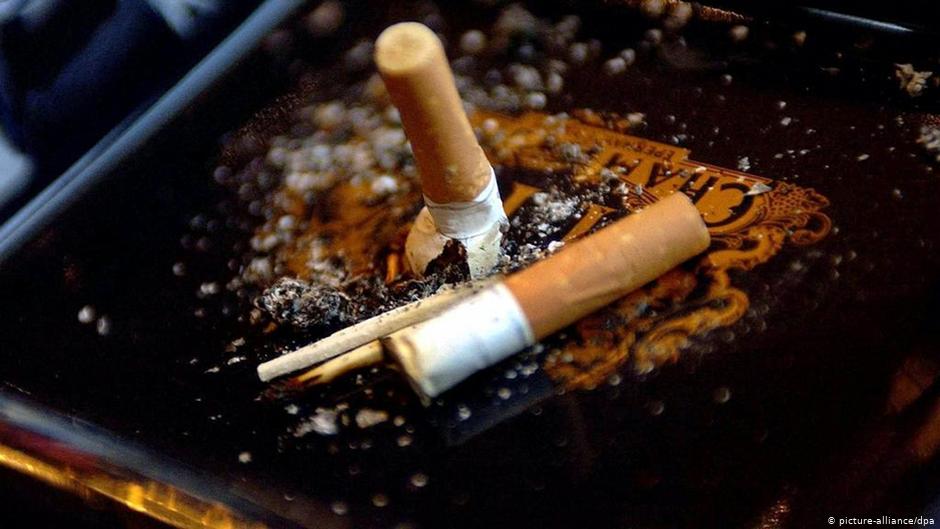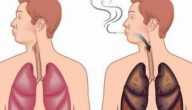تعريف التدخين بالانجليزي وماهي اهم اضراره وافضل طرق الاقلاع عن التدخين من خلال مقالتنا .
اضرار التدخين
يشكل التدخين ضررا على الصحة و البيئة حيث يسبب الكثير من الأمراض لدى المدخنين والأشخاص المحاطين بهم كما يسبب تلوث البيئة. تشير دراسات أجرتها منظمة الصحة العالمية أن التدخين يساهم في موت ما يقرب من 6 مليون شخص سنويا, أكثر من 83% يرجع الى التدخين المباشر و أكثر من 16% يرجع الى التدخين السلبي.
تشير الدراسات أن عددا قليلا فقط هم من يعرفون مخاطر التبغ على الصحة. أوضحت دراسة تم اجرائها عام 2009 في الصين الى أن 38% فقط من المدخنين هم من يعرفون أن التدخين يسبب أمراض القلب التاجية و 27% فقط من يعرفون أنه سبب سكتة دماغية, من ناحية اخرى, يحظى 15% فقط من سكان العالم بخدمات قومية و صحية للاقلاع عن التدخين.
Smoking is harmful to health and the environment; it causes many diseases for smokers and those around them, and causes pollution of the environment. WHO studies indicate that smoking causes about 6 million deaths per year, more than 83% of which are caused by direct smoking, while more than 16% of deaths are caused by secondhand smoke.
Studies show that few people are aware of the health risks of tobacco use. A 2009 study in China found that only 38% of smokers realize that smoking causes coronary heart disease, and only (27%) know it causes stroke,On the other hand, only 15% of the world’s population has comprehensive national cessation services to give up smoking.
بحث عن اضرار التدخين باللغة الانجليزية
When your parents were young, people could buy cigarettes and smoke pretty much anywhere – even in hospitals! Ads for cigarettes were all over the place. Today we’re more aware about how bad smoking is for our health. Smoking is restricted or banned in almost all public places and cigarette companies are no longer allowed to advertise on buses or trains, billboards, TV, and in many magazines.
Almost everyone knows that smoking causes cancer, emphysema, and heart disease; that it can shorten your life by 14 years or more; and that the habit can cost a smoker thousands of dollars a year. So how come people are still lighting up? The answer, in a word, is addiction.
Once You Start, It’s Hard to Stop
Smoking’s a hard habit to break because tobacco contains nicotine, which is highly addictive. Like heroin or other addictive drugs, the body and mind quickly become so used to the nicotine in cigarettes that a person needs to have it just to feel normal.
Almost no smoker begins as an adult. Statistics show that about nine out of 10 tobacco users start before they’re 18 years old. Some teens who smoke say they start because they think it helps them look older (it does – if yellow teeth and wrinkles are the look you want). Others smoke because they think it helps them relax (it doesn’t – the heart actually beats faster while a person’s smoking). Some light up as a way to feel rebellious or to set themselves apart (which works if you want your friends to hang out someplace else while you’re puffing away). Some start because their friends smoke – or just because it gives them something to do.
Some people, especially girls, start smoking because they think it may help keep their weight down. The illnesses that smoking can cause, like lung diseases or cancer, do cause weight loss – but that’s not a very good way for people to fit into their clothes!
Another reason people start smoking is because their family members do. Most adults who started smoking in their teens never expected to become addicted. That’s why people say it’s just so much easier to not start smoking at all.
The cigarette ads from when your parents were young convinced many of them that the habit was glamorous, powerful, or exciting – even though it’s essentially a turnoff: smelly, expensive, and unhealthy. Cigarette ads from the 1940s even showed doctors recommending cigarettes as a way to relax!
Cigarette ads still show smokers as attractive and hip, sophisticated and elegant, or rebellious and cool. The good news is that these ads aren’t as visible and are less effective today than they used to be: Just as doctors are more savvy about smoking today than they were a generation ago, teens are more aware of how manipulative advertising can be. The government has also passed laws limiting where and how tobacco companies are allowed to advertise to help prevent young kids from getting hooked on smoking.
How Smoking Affects Your Health
There are no physical reasons to start smoking – the body doesn’t need tobacco the way it needs food, water, sleep, and exercise. In fact, many of the chemicals in cigarettes, like nicotine and cyanide, are actually poisons that can kill in high enough doses. The body’s smart and it goes on the defense when it’s being poisoned. For this reason, many people find it takes several tries to get started smoking: First-time smokers often feel pain or burning in the throat and lungs, and some people feel sick or even throw up the first few times they try tobacco.
The consequences of this poisoning happen gradually. Over the long term, smoking leads people to develop health problems like cancer, emphysema (breakdown of lung tissue), organ damage, and heart disease. These diseases limit a person’s ability to be normally active – and can be fatal. Each time a smoker lights up, that single cigarette takes about 5 to 20 minutes off the person’s life.
Smokers not only develop wrinkles and yellow teeth, they also lose bone density, which increases their risk of osteoporosis (pronounced: ahs-tee-o-puh-row-sus, a condition that causes older people to become bent over and their bones to break more easily). Smokers also tend to be less active than nonsmokers because smoking affects lung power. Smoking can also cause fertility problems in both men and women and can impact sexual health in males.
The consequences of smoking may seem very far off to many teens, but long-term health problems aren’t the only hazard of smoking. Nicotine and the other toxins in cigarettes, cigars, and pipes can affect a person’s body quickly, which means that teen smokers experience many of these problems:
• Bad skin. Because smoking restricts blood vessels, it can prevent oxygen and nutrients from getting to the skin – which is why smokers often appear pale and unhealthy. An Italian study also linked smoking to an increased risk of getting a type of skin rash called psoriasis.
• Bad breath. All those cigarettes leave smokers with a condition called halitosis, or persistent bad breath.
• Bad-smelling clothes and hair. The smell of stale smoke tends to linger – not just on people’s clothing, but on their hair, furniture, and cars. And it’s often hard to get the smell of smoke out.
• Reduced athletic performance. People who smoke usually can’t compete with nonsmoking peers because the physical effects of smoking – like rapid heartbeat, decreased circulation, and shortness of breath – impair sports performance.
• Greater risk of injury and slower healing time. Smoking affects the body’s ability to produce collagen, so common sports injuries, such as damage to tendons and ligaments, will heal more slowly in smokers than nonsmokers.
• Increased risk of illness. Studies show that smokers get more colds, flu, bronchitis, and pneumonia than nonsmokers. And people with certain health conditions, like asthma, become more sick if they smoke (and often if they’re just around people who smoke). Because teens who smoke as a way to manage weight often light up instead of eating, their bodies lack the nutrients they need to grow, develop, and fight off illness properly.
Smoking Is Expensive
Not only does smoking damage health, it costs an arm and a leg. Depending on where you live, smoking a pack of cigarettes a day can cost about $1,800 dollars a year. That adds up. It’s money you could save or spend on something for yourself.
Kicking Butt and Staying Smoke Free
All forms of tobacco – cigarettes, pipes, cigars, and smokeless tobacco – are hazardous. It doesn’t help to substitute products that seem like they’re better for you than regular cigarettes – such as filter or low-tar cigarettes.
The only thing that really helps a person avoid the problems associated with smoking is staying smoke free. This isn’t always easy, especially if everyone around you is smoking and offering you cigarettes. It may help to have your reasons for not smoking ready for times you may feel the pressure, such as “I just don’t like it” or “I want to stay in shape for soccer” (or football, basketball, or other sport).
The good news for people who don’t smoke or who want to quit is that studies show that the number of teens who smoke is dropping dramatically. Today, only about 22% of high school students smoke, down from 36% just 7 years ago.
If you do smoke and want to quit, there’s more information and support out there than ever. Different approaches work for different people – for some, quitting cold turkey is best, whereas others find that a slower approach is the way to go. Some people find that it helps to go to a support group especially for teens; these are sometimes sponsored by local hospitals or organizations like the American Cancer Society. And the Internet offers a number of good resources. Check out some of these by clicking on the Resources tab to the right of this article. When quitting, it can be helpful to realize that the first few days are the hardest, and it’s normal to have a few relapses before you manage to quit for good.
Staying smoke free will give you a whole lot more of everything – more energy, better performance, better looks, more money in your pocket, and, in the long run, more life to live!
بحث علمي عن التدخين بالانجليزي
Smoking,, the slow killer
We all wonder of those people who refuse to live happy and healthy life, they choose to live miserable life intentionally! They want to commit slow suicide, you may ask your self whom are they, they are the smokers.
As we know that our age is full of experiments and discoveries, these experiments may become one day a bad or fatal habits that lead people to death. Smoking is considered one of those habits.
Unfortunately, that most smokers know that this unpleasant habit causes many diseases to them. Perhaps you would care to know that it has an adverse effect on lymph nodes, pituitary glands, nerves centers, heart, blood pressure and lungs, regardless of its fiscal disadvan***es.
How to quit smoking?
These are practical steps, but we need deeds not words:
* Delay the usual time of smoking, e.g. if you are smoking every day at morning, try to delay it to the afternoon, then try again to delay it to the night. The desire of smoking will reduce gradually.
* Try to avoid the places or attitudes that remind you with smoking. Most likely, you will be longing for smoking but you have to hold your horses.
* learn new hobbies and sports to fill your time as a trial to distraction from smoking.
In fact, they are more and more ways to quit smoking, but we want to notice that you have to put in your consideration the appropriate time and place, not to mention the praying and ask Allah to help you. If you do it, you will be obedient to Allah and held in respect from all people.
Finally, we hope that all smokers quit smoking and choose to live the happy and healthy life both now and in the hereafter. May the grace and peace of Allah be with you
برزنتيشن عن التدخين قصير وسهل
smoking can cause many bad diseases such as cancer and heart disease. also smoking can harm body cells and increase the risk of stroke. smoking can damage the human body with many other diseases as well. doctors always recommend smokers to stop smoking as soon as possible. x
التدخين يؤدي الى امراض كثيرة مثل السرطان وامراض القلب. ايضاً التدخين يضر خلايا الجسم ويزيد من الاصابة بالجلطة. التدخين يضر جسم الانسان في امراض عديدة كذالك. الاطباء دائما يوصون المدخنين بالتوقف عن التدخين في اقرب فرصة ممكنة.










